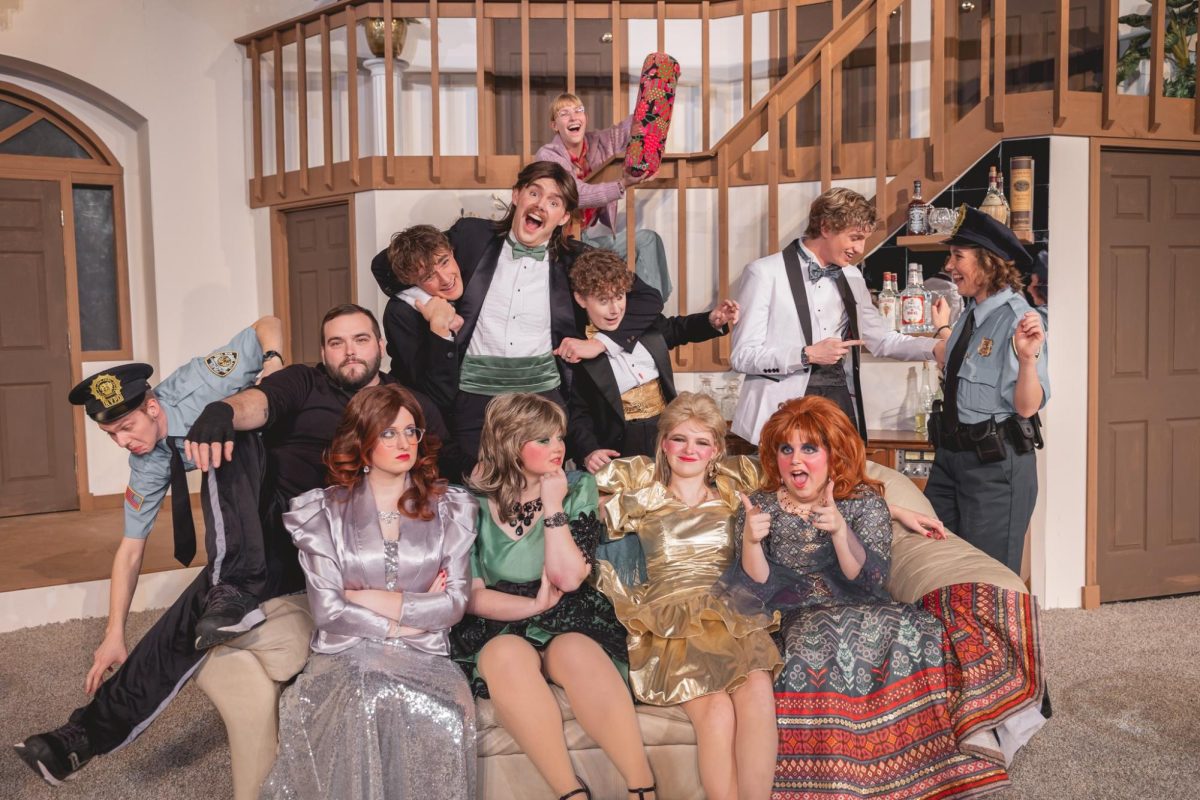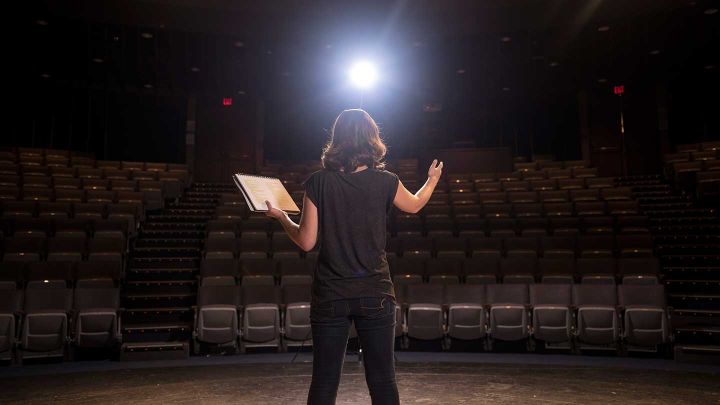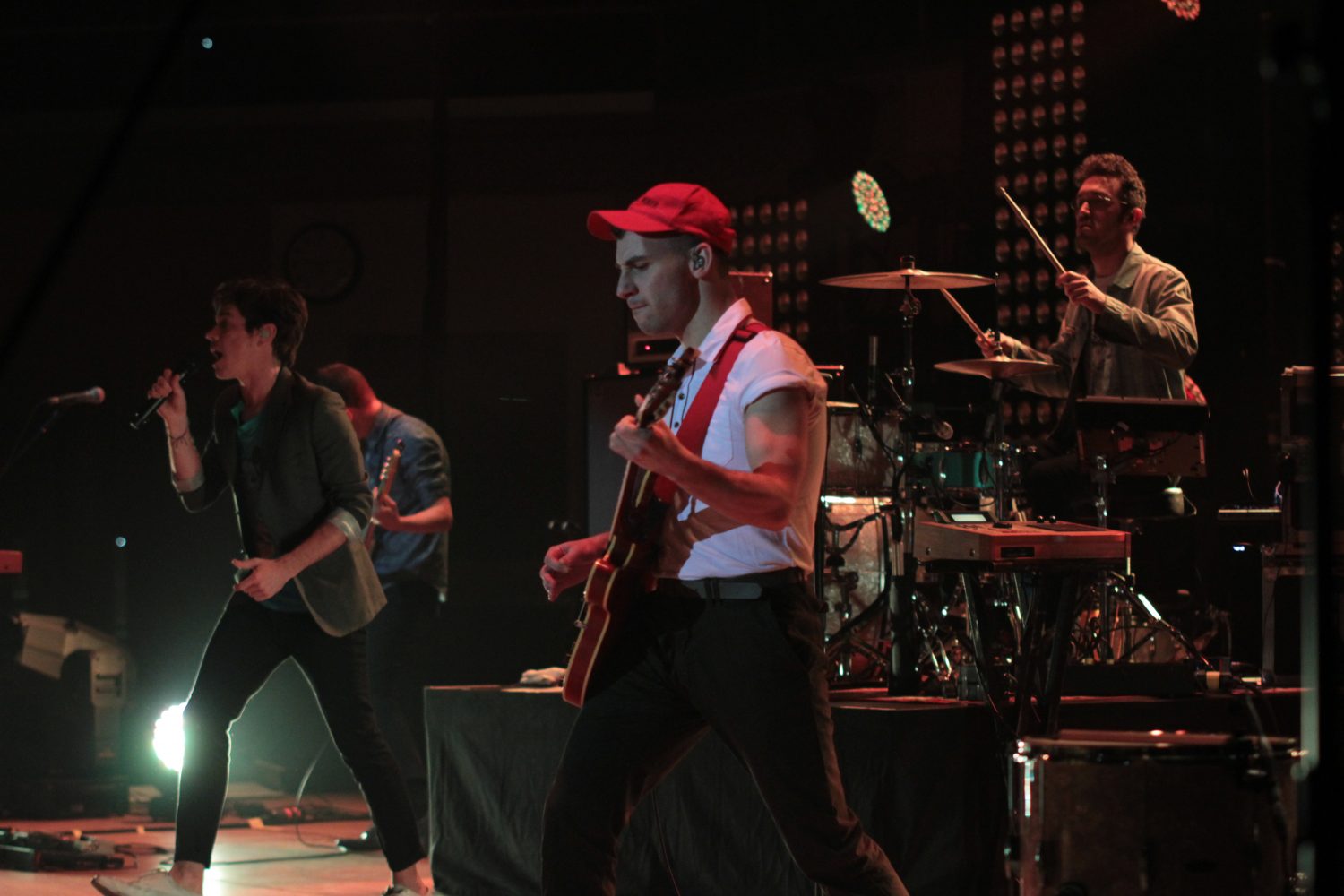
The Gezon auditorium, a uniquely shaped theater that has seen many interesting arrangements, has been transformed into a traditional proscenium theater in order to present Calvin Theatre Company’s fall production: the play within a play “The Mystery of Edwin Drood.”
The musical, a Tony-award winning adaptation of Charles Dickens’ novel by Rupert Holmes, is set in the city of Cloisterham in Victorian-era England. The performers are charged with playing two roles each — that of a Victorian actor in the company The Music Hall Royale, as well as the character that actor portrays.
Because Dickens died before he could finish his novel, the musical has “no concrete ending,” says Kelsey Blodgett, who plays Rosa Bud.
“There are multiple endings,” clarifies Maggie Ferntheil, a sophomore ensemble member. Indeed, in the play’s opening scene, The Chairman (Brian Alford), who acts both as narrator of the show/manager of the fictional theater and as a member of the action in “Drood,” declares “we will be asking you to vote on key points of our plot tonight.”
Audience members are asked to vote on who is responsible for the mysterious disappearance of young Edwin Drood (Emily Diener) and on which characters should pursue a love interest together.
“You get to choose your own ending,” says Diener, whose Victorian actor persona is a male impersonator. “How often have you wished you could change the ending of a play? Here, it’s interactive and you have the freedom to do that.”
As audience members can guess from the first few scenes, “Drood” is not your average musical.
“There’s tons of fourth wall breaking,” says ensemble member Annie Bulthuis, referring to the theater principle in which actors communicate directly with audience members. “Brian [Alford] is always talking to the audience, which is something you don’t see very often. The audience is participating, it’s a role in itself.”
The show has many other distinctive characteristics that have been surprising for cast and crew members. Costumes are a particularly challenging aspect.
“This is a period show, so even the girls’ underwear has to be a costume in itself,” says Kit Graham, assistant stage manager and costume shop worker. “All of the costumes were worked on. A few were old ones we reconstructed, but all of the principle girls’ dresses were completely constructed.”
Graham and Bulthius also noted that the period undergarments, like corsets and hoop skirts, had to be utilized during rehearsals so that actors could get used to their movements. Additionally, “the women playing men have had to bind their chests and get used to singing and dancing like that,” says Graham.
Another learning process for the company has been the challenge of researching the Victorian era, as well as the specific characters.
“We had Professor Ward in to talk about Dickens and his time period,” explains Ferntheil, referring to Calvin’s English professor and resident Dickens expert, Dean Ward.
“I play two characters,” notes Alex Cook when discussing the character research he did for the show. Cook play Durdles, a bumbling crypt keeper, and his Victorian actor persona is Nick Cricker, a less-than-reliable cast member of the Music Hall Royale. “They’re equally fun to me, and both represent positive and negative aspects of me. And, I love it when I get to play a character who drinks copiously.”
“So, you’re an ass and a drunkard?” interjects a crew member sitting nearby.
“Well, yes, if you want to put it succinctly,” grins Cook.
Compnay members have also been impressed with the quick community they’ve formed, and the quality performances by young members (six of the sixteen actors are first year students).
“Lots of shows have a mix of upper and lower classmen, but I’ve never seen a show with this much cohesion,” says Cook, a senior. Blodgett, a freshman, agrees.
“I came right in as a freshman and fit in quickly with the rest of the cast. That was a relief,” she says.
All told, company members young and old are impressed by the level of talent displayed in this year’s (the company’s 80th) season opener, particularly relating to the musical aspects of the show.
“Singing and dancing adds separate types of rehearsals,” says Bulthuis. “Some are just choreography or an hour of singing. You have to be more versatile as a performer.”
“You have to perform and act, but you also have to do movements and hit the notes,” agrees Diener. “It’s a whole new level, something not everyone can do. Having 16 who can is just fantastic.”
Professor Debra Freeberg, the show’s director, has also noticed the gifts and abilities of her cast and crew.
“This has been a joy. Every show is different. This one is different because it seems to have been an easier process. We didn’t have to yell and scream,” she laughs.
Charsie Sawyer, professor of music and music director for the show, chimes in: “It’s only going to get better. They haven’t even hit their peak yet.”
Sawyer describes the show’s music as “very lyrical.” Audiences will be exposed to award-winning tunes which “they’ll go home humming,” she says.
The company is eager to see which endings the audience chooses. While the up-in-the-air ending requires actors to be ready for anything, most find it a happy mix of stressful and exciting.
“Our fate is in the audience’s hands!” says Blodgett.
“The Mystery of Edwin Drood” runs at 7:30 p.m Nov. 1-3 and 8-10. Advance tickets are $8 students, $15 public.






